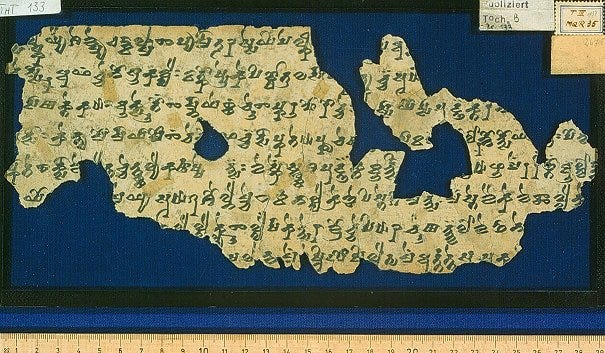Pasts Imperfect (9.7.23)
Saving World Languages at WVU, Egyptian Mummification Balms, Roman Swords, Displaying Filipino Artifacts & More

What is the worth of learning languages? This week, Carl Rice breaks down the proposal to abolish world languages and linguistics at West Virginia University in the United States. Then, a new study analyzes and reverse engineers mummification balms originally excavated from the Valley of the Kings, an auction house presents a private collection of Filipino artifacts, Roman swords from the Bar Kochba revolt, flamingos in ancient Mexico, and much more.
Saving World Languages at WVU by Carl Rice
On August 10, 2023—as faculty, staff, students, and parents were preparing for the start of the fall semester at West Virginia University (WVU)—President E. Gordon Gee and Provost Maryanne Reed announced a shocking series of proposals in response to an anticipated $45 million budget deficit and as part of the ongoing Academic Transformation initiative. The plan called for the elimination of 169 full-time faculty positions and the termination of 32 degree programs at the undergraduate and graduate levels.
Communities of solidarity have emerged on social media, in particular on Twitter/X, in the wake of this devastating decision. Students, faculty, staff, and alumni have rallied together to share information and to coordinate their resistance through digital channels. Those conversations, which are being led especially by women and people of color, are essential reading. Unfortunately, the WVU administration appears to be monitoring this social media output, and there are legitimate reasons to fear that participants in the discourse will face retribution. As a result, I have decided not to link to individual accounts or tweets, but readers should know that I am indebted to all of them.
Is this move simply a financial calculation as alleged? A quick look at the data from the Provost’s Office, suggests that it is more than a mere financial move. World Languages, Literatures, and Linguistics, which is slated for near-total elimination, generates approximately $800,000 in surplus each year. Similarly, the English department, which faces an approximately one-third reduction of its faculty, earns nearly $2 million for the university while teaching nearly every undergraduate on campus. It’s certainly surprising that a university facing an unprecedented financial crisis can afford to significantly reduce profit-making departments and programs.
The disregard for humanistic education seems to be part of a longer trend at WVU. During the first phase of the Academic Transformation initiative in 2021, a Provost’s office review identified approximately fifteen majors for discontinuance. As I noted at the time, nearly all of them were arts and humanities programs and these lists portended a troubling vision for WVU’s future. It’s true that the study of the premodern world has not been a priority for WVU’s administrators for some time.
It boggles the mind, however, to imagine how an administrator at an R1 university can seriously suggest that the study of pivotal world languages like Spanish, Chinese, or Russian no longer belong at their institution, or how they can claim that the critical analysis skills English faculty teach are unnecessary. These courses of study, among others, equip students with important critical thinking skills, as they empower them to engage in a global world as thoughtful and articulate citizens. If that’s not at least part of what a university education is designed to do, especially in our present global political moment, then what is the point?
The administration is right when they situate these proposals in the context of Academic Transformation at WVU: these proposals would transform the academic experience at WVU for the worse. At their most fundamental level, these plans devalue the transformation that happens when talented students encounter dedicated teachers around issues of global importance. They also ignore the necessity of a well-rounded liberal arts education for today’s students. Denying undergraduates access to a quality education is a dangerous precedent to set and, as Myya Helm so powerfully tells us, “Those who decide what is worth learning … will never bear the brunt of their own choices.”
While I was a student at WVU from 2009 to 2013, I was fortunate to grow at a university that still valued a broad liberal arts perspective as part of its land grant mission. Sadly, I fear, Gordon Gee and Maryanne Reed have forsaken that ambition. The faculty, staff, and students who will suffer the consequences deserve so much more than what WVU has given them. Fortunately, although they’re scared of and uncertain about what the future may hold, faculty and students at WVU are organizing and fighting back. Faculty appealed these recommendations and have called for a vote of no confidence in Gee, while student leaders have rallied and demanded an external audit. In some cases, they have won.
I hope Pasts Imperfect readers will join them in solidarity and action and work to stop the evisceration of WVU. The final decision now rests with the WVU Board of Governors who will meet on September 15, 2023. Please write to them or call them (304.293.8531) to share your concerns, to let your voices be heard, and to stand together alongside the faculty, staff, and students at WVU and all they have to offer the world.
For their part, the WVU Faculty have just voted overwhelmingly in favor of the No Confidence Resolution. They are beginning debate to vote on a resolution to freeze the "Academic Transformation" and cuts. As English professor Laura Farina told the West Virginia MetroNews,“There is no real restraint on Gee’s administration. The only corrective can come from public outcry and protest by students and employees.”
Public Scholarship and a Global Antiquity
A new article in Scientific Reports analyzes the embalming residues left in canopic jars originally excavated by Howard Carter’s team in the Valley of the Kings in 1900. Researcher Barbara Huber and her team have now “recreated one of the scents used in the mummification of an important Egyptian woman more than 3500 years ago.”
This so-called “scent of eternity” will be available for sniffing at a future exhibition at the Moesgaard Museum in Denmark. As the Max Planck Institute notes, “The team found that the balms contained a blend of beeswax, plant oil, fats, bitumen, Pinaceae resins (most likely larch resin), a balsamic substance, and dammar or Pistacia tree resin.” Three cheers for creating more multi-sensory experiences for the museum space through olfactory recreations.

Over at Vogue Philippines, we’ve got some precolonial bling. I guess if rich people are going to own artifacts, it’s nice that they’ll exhibit them to the public—although only ethically sourced and purchased pieces, please. Aileen and Edwin Bautista’s private collections of gold jewelry feature pieces important to Philippine history, but raise a number of important questions about repatriation and museum display.
“Should I acquire [Philippine artifacts] to repatriate back to our country, or leave them abroad, never to be seen and appreciated by Filipinos?”
At ASOR’s Ancient Near East Today, Seth Sanders asks “Who Really Invented the Alphabet?” Most likely, the originators were “creative people at the margins,” rather than professional scribes, and it seems to have been developed for informal uses such as graffiti, that is, for fun.

Four well-preserved Roman swords (three still in scabbards) were discovered in the desert near the Dead Sea in Ein Gedi National Park—and archaeologists think they likely date to the Bar Kochba (132-135 CE) revolt. These caves are already rich in lore after fragments of the Dead Sea Scrolls were found in one.
Maya Chakravorty wrote for the NEH-funded project, The Performance of Roman Comedy, with a blog on “By The Gods Above, Below, and In-Between: Religion and Roman Comedy.” Chakravorty discusses a session focused on the “intersection between Roman comedy and religion with Professors Seth Jeppesen and Dan-el Padilla Peralta.” Take a look at this amazing project and stay tuned for more on it in future issues of PI.
Historical linguists at the University of Leiden continue to trace the evidence for Proto-Indo-European (PIE). The language was spoken 4,500-2,500 years ago and stretched from modern Europe to the Tarim Basin in China. Ali Jones writes about a project studying it, The TocharianTrek, in Phys.org, “The people who spoke PIE probably lived in an area that is now eastern Ukraine. As groups broke away over the centuries to migrate across the continent, daughter languages stretched from Ireland to the Indian Ocean.” The Project PI, Michaël Peyrot, notes on the project site the import of studying historical linguistics for the recovery of the past:
Languages preserve precious information about their prehistory through the effects of language contact. Through close scrutiny and periodisation of the different layers of contact of Tocharian and its prehistoric neighbours, the project will reconstruct the migration route of the Tocharians from the Proto-Indo-European homeland all the way to China.

Finally, an ancient flamingo egg 🦩 was found in Mexico during recent construction work on a new airport. The fossil dates to 10,000-6,000 BCE and is the first discovery connected to the Phoenicopteridae flamingo family in the Americas. As Reuters first noted, “The fossil egg implies that the area was the site of a shallow lake between 8,000 and 33,000 years ago, according to Mexican scientists, and that flamingos once thrived in central Mexico.” We can’t help but think that Apicius would find this new find rather tasty.
New Antiquity Journal Issues (by @YaleClassicsLib)
Digital Scholarship in the Humanities Vol. 38, No. 3 (2023) NB Chiara Palladino & Tariq Yousef, “To say almost the same thing? A study on cross-linguistic variation in ancient texts and their translations”
Near Eastern Archaeology Vol. 86, No. 3 (2023)
Antike und Abendland Vol. 69 (2023) NB Katharina Wesselmann, “Ψεύσματα ποικίλα: Lukians Wahre Geschichten und Amerigo Vespuccis Berichte aus der Neuen Welt”
Forum Classicum No. 2 (2023) #openaccess
The Journal of Medieval Religious Cultures Vol. 49, No. 2 ( 2023)
Arion Vol. 31, No, 1 (2023)
Acta Classica Universitatis Scientiarum Debreceniensis Vol. 59 (2023) #openaccess
Latomus Vol. 82, No. 1 (2023)
Acta Antiqua Academiae Scientiarum Hungaricae Vol. 63 , No. 1 (2023)
Frammenti sulla Scena Vol. 3 (2022) #openaccess
Classical World Vol. 116, No. 4 (2023) NB Andres Pelavski, “Impaired Consciousness, Madness and Mental Incapacitation in the Roman Law”
Journal of Ancient Near Eastern Religions Vol. 23, No. 1 (2023)
Helios Vol. 49, No. 2 (2022)
Journal of Early Christian Studies Vol. 31, No. 3 (2023)
Erudition and the Republic of Letters Vol. 8, No. 3 (2023) NB Ada Palmer “Pomponio Leto’s Lucretius, the Quest for a Classical Technical Lexicon, and the Negative Space of Humanist Latin Knowledge”
Online Lectures, CFPs, and Current Museum Exhibitions
On September 17th and 18th the Bibliotheca Alexandrina will host a hybrid workshop of the Between Athens & Alexandria project: “Metaphysics in Early Neoplatonism: Porphyry on Soul.” The workshop will explore the original metaphysical and psychological contributions of the Plotinus’s student and editor.
APGRD (Archives of Performances of Greek & Roman Drama) and ReTAGS (Reimagining Tragedy in Africa and the Global South) will cohost a hybrid conference September 26th & 27th: “Re-Imagining Tragedy Across Africa and the Global South.” Scholars and artists will explore the adaption and refiguring of the European concept of tragedy in post-colonial Africa.








One of the interesting, provocative and negative social attack on students and qualified professor self-educational determination at West Virginia University. Will this permeate across the University and College spectrum?
An attack on private education is an violation human rights.